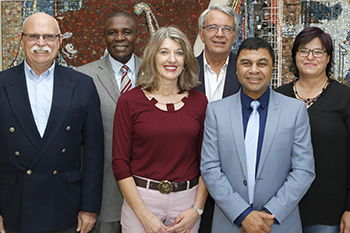
Willem Louw, Chairperson of the UFS Council;
Dr Khotso Mokhele , Chancellor of the UFS,
Eleanor van der Westhuizen, from the Directorate
of Research Development; Prof Francis Petersen,
UFS Vice-Chancellor and Rector; Prof Fanie Snyman,
Dean of the Faculty of Theology; and
Prof Corli Witthuhn, Vice-Rector: Research.
Photo: Johan Roux
The most sought-after award at the UFS, the annual Book Prize for Distinguished Scholarship, was recently won by Prof Fanie Snyman, Dean of the Faculty of Theology and Religion. His book, Malachi, which is about the last book of the Old Testament, has received acknowledgement through this award. He is the third academic to be awarded this prize. The book was published in English by Peeters Publishers in Belgium as part of the ”Historical Commentary on the Old Testament” series with a view to an international audience, and can be used by theology scholars and academics.
Labour of love over many years
Prof Snyman has a long history with the Bible book of Malachi. Since his student years, this book in the so-called ‘Minor Prophets’ of the Old Testament had a special charm for him. In fact, Prof Snyman has produced several publications on this concise book of 55 verses over the years. Furthermore, his doctoral thesis, as well as several papers delivered at congresses, also had this book as the theme. It took Prof Snyman about a decade to write the book.
What lies ahead for him in the future? “I am closing the book Malachi for the time being,” says Prof Snyman. “However, my research on the ‘Minor Prophets’ will continue. As a result of Malachi, InterVarsity Press in Cambridge contacted me for the writing of a book in another international commentary series, this time on the books Nahum, Habakkuk, and Zephaniah.” Prof Snyman will use his prize money of R75 000 towards this goal.
Book prize a surprise
“I can sincerely say that I did not expect the award at all. I did not know which other excellent research was submitted and thought that research from another discipline might do better. Therefore, I was completely surprised when my book was announced as the winner, and it left me speechless at the moment!” says a modest Prof Snyman.
He adds: “I am sincerely grateful for this award, but I must also thank the university. I would like to express my appreciation for the academic milieu, financial support, as well as overseas travel opportunities that have enabled me to complete the book and achieve this award.”
Book review by international expert
Prof Rainer Kessler, a world-renowned expert on the Bible book of Malachi, said in a review of Malachi: “The commentary on Malachi in the renowned Historical Commentary on the Old Testament series is the fruit of decades of studies on the book. [It] is full of respect towards the text. [Prof] Snyman is very cautious in his judgements and decisions. He rather presents different possibilities than uttering one-sided positions. [Finally, he] treats others always in a very fair manner. He presents their opinions as objectively as possible, especially when he does not agree. This commentary is a new and very useful tool for the study on the often underestimated last book of the Old Testament prophets.”